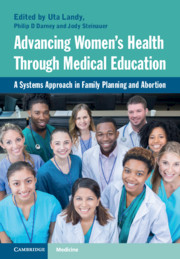 Advancing Women's Health Through Medical Education
Advancing Women's Health Through Medical Education A Key Component of Training and Service Delivery in Sexual and Reproductive Health Care
from Section III - Family Planning Curricular Design & Implementation
Published online by Cambridge University Press: 30 July 2021
Teaching, learning and providing emotional support in the sexual and reproductive healthcare setting is a key component of successful and sustainable abortion and family planning programs.Beneficial outcomes – for both patients and providers –are tied to the skillful provision of emotional support and patient-centered communication.In this chapter, the activity of pregnancy decision counseling is used to illustrate self-knowledges, attitudes, and skills by which emotional support is operationalized within the framework of an Entrustable Professional Activity.Guidance is provided for self-directed learning in active listening, assessment, analyzing assumptions and recognizing bias.The deliberate practice and cognitive apprenticeship models describe the roles of teacher and learner in the real-world setting of the medical environment.Emotional support lends itself to these models in the same way as other important, routine activities that are essential to providing high-quality patient-centered care.
To save this book to your Kindle, first ensure [email protected] is added to your Approved Personal Document E-mail List under your Personal Document Settings on the Manage Your Content and Devices page of your Amazon account. Then enter the ‘name’ part of your Kindle email address below. Find out more about saving to your Kindle.
Note you can select to save to either the @free.kindle.com or @kindle.com variations. ‘@free.kindle.com’ emails are free but can only be saved to your device when it is connected to wi-fi. ‘@kindle.com’ emails can be delivered even when you are not connected to wi-fi, but note that service fees apply.
Find out more about the Kindle Personal Document Service.
To save content items to your account, please confirm that you agree to abide by our usage policies. If this is the first time you use this feature, you will be asked to authorise Cambridge Core to connect with your account. Find out more about saving content to Dropbox.
To save content items to your account, please confirm that you agree to abide by our usage policies. If this is the first time you use this feature, you will be asked to authorise Cambridge Core to connect with your account. Find out more about saving content to Google Drive.